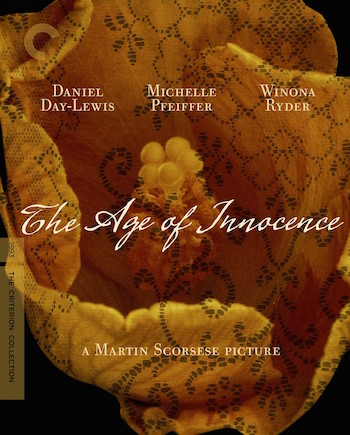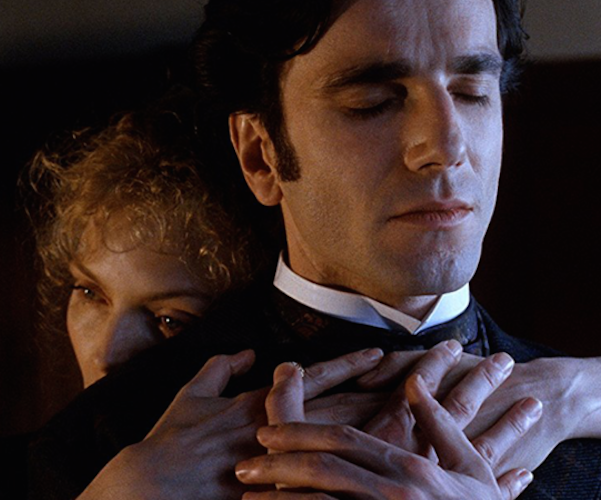Film Review: Scorsese’s “Age of Innocence” — Re-released
The privilege Edith Wharton’s characters swim in has not disappeared. If anything, it’s expanded farther into the social stratosphere.
By Matt Hanson

Director Martin Scorsese is probably best known for gritty, streetwise dramas (one critic suggested his most emblematic movie title would be “I’m Gonna Fucking Kill You”). But his world-class cinematic expertise extends way beyond the manners of the mean streets. Until Netflix agreed to finance his latest film, he’s had to work within in the Hollywood system, which means alternating between loud, blood-spattered crowd pleasers with quieter, more personal chamber pieces. Usually, the latter are personal projects with spiritual themes, such as The Last Temptation of Christ, Kundun, and the recent missionary epic Silence. 1993’s The Age of Innocence, based on Edith Wharton’s Pulitzer-winning 1920 novel and recently re-released from Criterion, is perhaps his most exquisite of his non-splatter films.
Everybody is playing against type: the movie takes place in Scorsese’s home turf of New York City, but this time it’s set among it’s upper crust, with the post-Civil War Gilded (not golden) Age in full swing. Daniel Day-Lewis is probably the most intensely physical actor of his generation; for that matter, probably the most intense, period. His Newland Archer is the epitome of restrained, well-bred elegance. Michelle Pfeiffer and Winona Ryder are lovely actresses whose attractiveness is underplayed here, let to simmer far below the genteel surface. If anything, their repressed sex appeal is precisely what gets their characters in trouble in the first place.
The plot hinges on Newland Archer’s anguished choice between two women, the one he is socially sanctioned to marry, the virginal May Welland, played with subtle guile by Ryder in an Oscar-nominated performance, and the one he longs for, the Countess Olenska, whose scandalous divorce from her cad husband brands her a pariah among Archer’s prim and proper peers. She is a woman who refuses to accept subordinate status in her marriage and in her life. Like all pioneers, she pays a high price. In her rigid social world the price of independence is subtle but devastating ostracism. Archer supports her feminism in theory, but he doesn’t have the courage to put his ideals into practice. The glittering, stately world he inhabits won’t allow it and his compatriots aren’t shy about letting him know.
In the voiceover, Joanne Woodward reads from Wharton’s quietly seething text, pointing out the implicit brutality of this deeply hermetic society: “In reality they all lived in a kind of hieroglyphic world, where the real thing was never said or done or even thought, but only represented by a set of arbitrary signs…yet each of them felt obliged to simulate reluctance…as, in the books on Primitive Man that people of advanced culture were beginning to read, the savage bride is dragged with shrieks from her parents’ tent.”
In Archer’s world, reputation is everything because everything is surface. The great Michael Bellhaus’s camera luxuriously glides through the elegant hallways adorned with lovely paintings, a gorgeously expressive but confined space of refinement and leisure which ultimately rings hollow. The grand passions depicted on the canvas are ornaments of wealth rather than expression of desire, barely glanced at by those privileged to see them. The emotional drama depicted by the old masters is ignored by a society that subtly controls every aspect of its member’s lives. A declined dinner invitation or a malicious whisper spells instant exile; an elaborate table setting stands as a giant middle finger to the guest of honor. Most of the swells don’t mind their pampered status, alone question it. Archer is caught in the middle. He’s too refined to dare lose his blue-chip standing among New York’s elite, but he has just enough of a heart and a mind to know how bullshit it all is. He hasn’t the bravery to pursue his heart’s desire, in the fetching but slightly exoticized form of Countess Olenska.

Michelle Pfeiffer and Daniel Day-Lewis in “The Age of Innocence.”
Archer’s protective sense of decorum means he won’t allow himself more than one or two anguished kisses of his beloved’s hand or wrist. He manages to maintain a comfortable but inauthentic life. At least he has his dignity, a space reserved just for himself. In our hyper-confessional era, this kind of personal space is almost quaint. Everything we do (or want people to know about) is eagerly broadcast to the rest of the world; our tastes, beliefs, and desires are public fodder for the world’s consumption as well as the profit of direct marketing. Instead of suffering in masochistic silence, a 21st Century Archer would probably seek his consolations (wholesome or otherwise) on the internet.
But that’s just on the surface as well, of course. The images and stories we feed others are inherently skin deep; premeditated performances for a curated solo show. On some level, we are constantly displaying carefully arranged versions of ourselves, just as the conspicuously bored aristocrats do in Archer’s drawing rooms. Life at this level of the Gilded Age was all about keeping up appearances; and that is very much the name of the game on social media. The privilege Wharton’s characters swim in has not disappeared. If anything, it’s expanded farther into the social stratosphere: we’re just more open (and have figured out how to make money) on talking about its down side. A cage is still a cage, gilded or otherwise.
In Wharton’s time, being wealthy meant performing a theatrical role, adhering to an Anglophile sense of noblesse oblige, imitating the formality and dutiful chastity of the old world. As the story progresses, Archer surrenders much of his own will in order to live up to this banal standard. Nowadays, the situation has reversed itself. If anything, demonstrating the ability to put one’s desires front and center (never mind the consequences) amounts to showing the world that you’ve made it. Sobriety, chastity, and restraint are ‘virtues’ relegated to the loser underclass. Look no further than the current First Family, each ‘winner’ a case study in ravenous megalomania, proving that in this ‘innocent’ age of shamelessness being rich means never having to say you’re sorry.
Matt Hanson is a critic for The Arts Fuse living outside Boston. His writing has appeared in The Millions, 3QuarksDaily, and Flak Magazine (RIP), where he was a staff writer. He blogs about movies and culture for LoveMoneyClothes. His poetry chapbook was published by Rhinologic Press.
Tagged: Criterion Collection, Edith Wharton, Martin Scorsese, Matt Hanson
